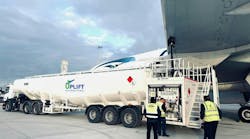Dec. 11--Autotrophic, if not automatic, for the people.
Phillips 66 hopes it can usher in a new generation of fuels by working with Sapphire Energy Inc. to convert algae into "green" crude oil, the Houston-based refining and research giant announced Tuesday. The work may take several years to complete.
The agreement between Phillips 66 and Sapphire is designed to take production of algae crude a big step in the direction of commercial use. Phillips 66's research center in Bartlesville will be involved in the work toward developing commercial-scale green crude oil.
"Yes, the Sustainable Technology group in Bartlesville will be working with Sapphire Energy to advance some commercialization of algae crude," Phillips 66 spokesman Dean Acosta replied in an email. "Sapphire Energy is already testing algal crude's readiness for refining in small quantities. Phillips 66's focus will be on whether that process can be scaled up and whether the products produced can meet EPA requirements."
San Diego-based Sapphire already has entered into production contracts with two companies, including Phillips 66, in the past year. It is now producing crude oil from algae biomass cultivated and harvested at its Green Crude Farm in Columbus, N.M.
"We are continually on the lookout for promising technology advances in energy manufacturing and logistics," Merl Lindstrom, vice president of technology for Phillips 66, said in a statement. "We believe this joint development project with Sapphire Energy could produce a refinery-ready, sustainable product for Phillips 66, creating yet another exciting opportunity in this rapidly changing energy landscape."
The companies hope to be at commercial demonstration scale by 2015, commercial scale three years later and producing 1 billion gallons annually by 2025.
Sapphire's website says its fuel has been tested in two jet flights, with Continental Airlines and Japan Airlines.
Energy research using algae is hardly new. ExxonMobil Corp. has spent upwards of $600 million on developing algae-based fuel, although CEO Rex Tillerson said earlier this year that solid results might be 25 years away.
Proponents of the process say the autotrophic organism naturally produces many more times the fuel than ethanol using the same amount of space. The technical hurdles, however, may limit the scope or scale of production in the short term, Tillerson cautioned during a television show.
Phillips 66 employs 2,000 people at its Bartlesville support center and close to 700 at its Ponca City crude oil refinery. The company was part of ConocoPhillips before a corporate spinoff in 2012.
FAQs about turning algae into crude oil
Who is trying it?
Phillips 66 and Sapphire Energy, ExxonMobil and Synthetic Genomics, Texas A&M.
How does Sapphire do it? Grows algae in open ponds with only sunlight, carbon dioxide and nonpotable saltwater.
How long does it take to extract oil from algae? 14 days from seed through extraction.
Timeline for commercialization? Commercial scale by 2018 is projected.
Rod Walton 919-581-8457
Copyright 2013 - Tulsa World, Okla.



